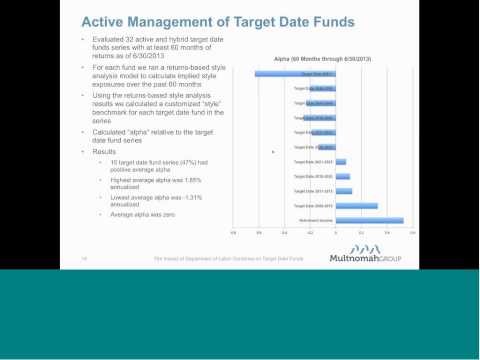RETIREMENT TIPS Pros and Cons of TargetDate Funds
Post on: 23 Август, 2015 No Comment

By ALAN KONDO, CFP, CLU
Target-date funds provide investors with the ability to simplify their financial and investment lives (1). With target-date funds, your portfolio’s asset allocation is automatically rebalanced on your behalf over the years by professional investment managers, generally growing more conservative as the identified target date approaches.
Target-date funds are common in 401(k) offerings and make it easier for the employee to choose a more balanced and diversified portfolio.
On the surface, it sounds like a winning proposition. Nevertheless, you should proceed with caution. For some 401(k) plans, conflicts of interest lie under the surface that may affect your investment performance, which I will explain a little later.
Unlike lifestyle funds, target-date funds do not require investors to reassess their priorities and transfer money to a different fund as goals approach and priorities change. Generally speaking, the name of each target-date fund includes a specific year, such as “2030” or “2045.” All you need to do is choose a fund named for the year closest to the year of your projected retirement. From that point on, professional investment managers make all the investment decisions.
Understanding the Investment Strategy
Target-date investments follow what is known as a “glide path.” The glide path maps out the investment’s asset allocation over time — the way it is divided between the principal asset classes of stocks, bonds, and cash. How your assets are allocated among these investments is a major factor in determining portfolio volatility and risk (2).
As you approach retirement, a target-date investment typically reduces its holdings of stocks while increasing its exposure to less risky bonds and cash. Target-date investments provide investors with instant diversification into different asset classes (2).
A target-date investment’s goal is to make the investing process simple. This “set it and forget it” style also makes investors less likely to allow short-term market fluctuations to adversely affect their investment decisions.
The Downside of Target-Date Funds
I would be remiss if I did not also explain to you the real dangers inherent in target-date 401(k)s. Target-date options may be ideal investments for some participants, but you should not be lulled into complacency just because you believe your 401(k) “runs on its own.”
During the housing crash of 2008 and 2009, some 401(k) account holders were shocked to realize that they were heavily invested in mortgage-backed securities. I have seen target-date options that are missing important asset classes entirely, such as small companies or emerging markets.
You should remember that the asset allocation within a target-date fund is the educated guess of a fund manager who is aiming to please an “average” retiree. Your personal risk tolerance could be more conservative or more growth oriented than the “average.”
Moreover, the funds selected by the 401(k) broker may be very expensive, affecting investment performance. Ironically, if you asked employees how much their 401(k) cost them, many would answer, “Nothing at all.” Last month’s “Frontline” documentary exposed that a typical 401(k) has layer upon layer of fees that can add up to $155,000 for a family over a lifetime.
This is because 401(k)s are sold by brokers, and brokers are salespeople. They tend to sell what is most profitable to them. Mutual funds pay brokers revenue-sharing fees in order to be placed on the 401(k) menu, and that cost is passed on to the employees. Consequently, a target-date fund could be made up of the most expensive options.
While you are working, you will have to live with the 401(k) that your company provides – you have no choice in that decision. When you change jobs or retire, you will have the opportunity to roll your 401(k) into an individual retirement account (IRA) over which you will have greater control.
Meanwhile, if you want to be confident that you are making the best choices within your 401(k), consult with your Certified Financial Planner™ for an objective analysis and recommendation.
1 The principal value of target-date funds is not guaranteed at any time, and you may experience losses, including losses near, at, or after the target date, which is the approximate date when investors reach age 65. The funds emphasize potential capital appreciation during the early phases of retirement asset accumulation, balance the need for appreciation with the need for income as retirement approaches, and focus more on income and principal stability during retirement. There is no guarantee that the funds will provide adequate income at and through your retirement.
Target-date funds invest in a broad range of underlying mutual funds that include stocks and bonds and are subject to the risks of different areas of the market. Target-date funds maintain a substantial allocation to stocks both prior to and after the target date, which can result in greater volatility. The more a target-date fund allocates to stock funds, the greater the expected risk. For further details on the risks associated with investment in a target-date fund, please refer to the fund’s prospectus.
2 Asset allocation and diversification do not ensure a profit or protect against a loss.
The opinions expressed above are solely those of Kondo Wealth Advisors, LLC, a Registered Investment Advisor in the state of California. Neither Kondo Wealth Advisors, LLC nor its representatives provide legal, tax or accounting advice.














